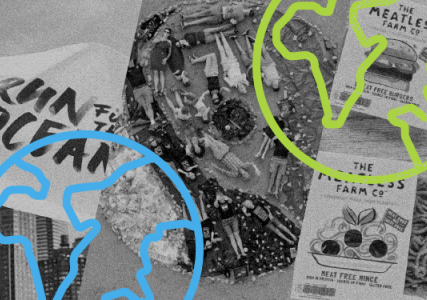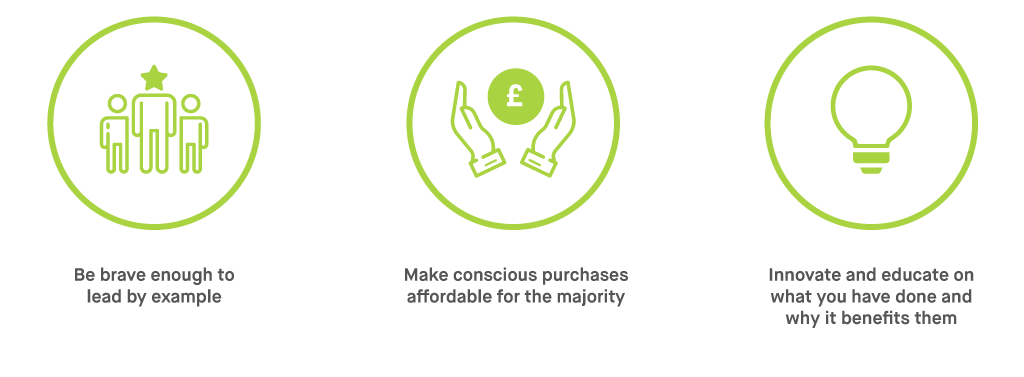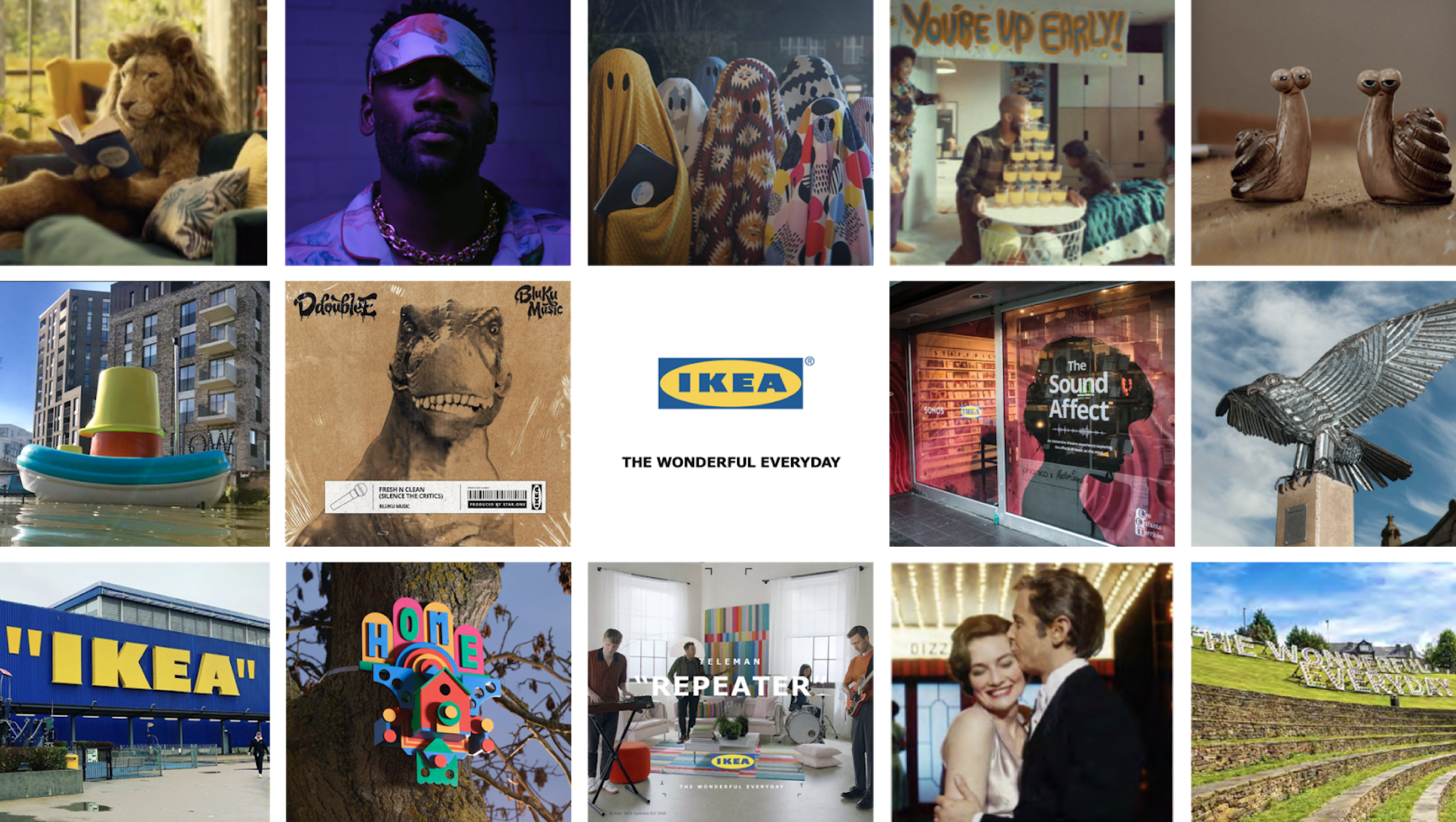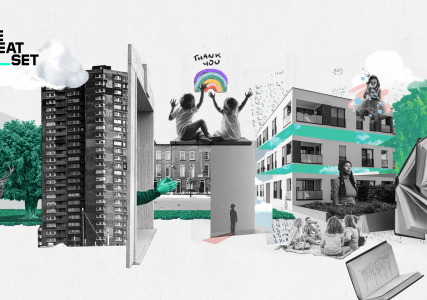
Going Green: Advertising Campaigns from Sustainable Brands
Discover case studies from our agency community making their mark on sustainable brands.


Share
2020 saw the disruptive effects of climate change with the bushfires sweeping devastation across Australia, alongside a global pandemic that brought the world to a standstill. It also showed us what would happen to the climate when humans took a moment to pause. Dolphins glimmered in the once murky canals of Venice, while the bold goats of Wales took to grazing the hedges and flowerbeds of the villagers’ gardens.
Depsite Steven Harrison recently writing in Campaign advertisers need to stop trying to save the world and start selling, there’s no shying away from the fact we’re running out of time and brands are under an increased pressure to adapt to climate pressure. And therefore, sustainability is taking its moment in the spotlight for the creative world.
Whether a focus on sustainability is new to your brand or something you’ve always channeled, this guide is a central hub of valuable resources from our agency community; where this drive for change has come from, who’s driving it, and insight into what other agencies and brand partnerships are already doing in the green space and perhaps the next new normal we’re about to all embark on.
2021 has seen a record-breaking Veganuary, with plant-based products like This! And Beyond Meat making their mark as consumers look for meat alternatives, while other brands frantically attempt to remove plastic from their packaging with Corona recently taking the headlines (for better reasons than 2020) for debuting circular packaging made from barley straw
As Kazzo writes in its insight paper into The Rise Of The Conscious Consumer, conscious consumers are demanding that brands show us they care about the planet and demonstrate it single-mindedly. Part one looks at how the Conscious Consumer was born while part 2 explores what they will buy into in 2030.

Georgina Wilson-Powell, Founder of Pebble echos the above and kicked off the year with the statement “with or without a pandemic, conscious consumers are still calling for changes that will help them make better purchasing decisions in line with their values”. In the article Not the Year Ahead: Sustainability she summaries the need for more transparency around sustainable items and delves into results of the agency’s recent survey which found 67% say they're happy to pay more for sustainable brands.
While in Wolff Olins annual leadership summit which was focused on Conscious Brands, a new era for branding, Sairah Ashman, Global CEO, shares the lessons learned from the event and outlines why a human-centric conscious agenda will be a must-have for any brand.
With or without a pandemic, conscious consumers are still calling for changes that will help them make better purchasing decisions in line with their values
Georgina Wilson-Powell, Founder of Pebble
As sustainability becomes more central to the way consumers choose to shop, fashion retailers are one of the industries under more scrutiny than ever to look at their supply chain. And nowhere is this becoming more apparent than with young consumers, so if brands want a piece of the Gen Z pie, they’re going to have to adapt. And fast.
BITE’s Deputy Editor Izzy explores the shift from fast fashion to slow and the rise of retailer’s sustainable future. She explains “this emerging cyclical economy is being driven by younger millennials and Gen Z consumers. They are shopping on resale platforms like Depop and raiding their parents’ wardrobes to create looks that are at once sustainable.”
The article For Gen Z, consumption is about self-expression also highlighted 94% of Gen Z believe that companies have a responsibility to make the world a better place, according to a study done by 3BL Media.
Jack Fancy, Creative Lead at Mc&T, shares his thoughts on Gen Z and sustainability through the lens of the innovations and trends predicted by LSN:global in their latest futures report where he writes for Gen Z the conversation of sustainability has evolved to sit at the intersection of everything they do.
While Megha Sthankiya, Senior Culture Strategist at The Marketing Store looks at Gen Zs shift in wanting access over exclusivity. For the most entrepreneurial generation yet, Megha answers the question “what do you offer people who are more concerned with their own brand than getting free stuff from other brands?”
This emerging cyclical economy is being driven by younger millennials and Gen Z consumers
Izzy Ashton, BITE Deputy Editor
Take inspiration from the brands Going Green that got us doing more than taking including Mother’s recent campaign for IKEA and the Wonderful Everyday. The campaign launched after IKEA’s commitment to sustainability and delivered unprecedented growth for IKEA. It’s consistently recognised as one of the most effective, creatively awarded, and enduring campaigns in the UK.

Authentic brands are those who master the art of aligning what they say they stand for to what they actually do. And consumers are yearning for authenticity now more than ever.
BITE’s Deputy Editor Izzy Ashton told Drapers back in June: “Brands cannot say one thing and do another and think they won’t be found out. Where brands often go wrong is co-opting a movement into their marketing without engaging the communities at the heart of it and examining their own history – just look at what happened with L’Oréal.”
The situation with L’Oréal was a clear example of an inauthentic brand as they outlined their support for Black Lives Matter over social media, seeming for a moment to forget their treatment of Munroe Bergdorf.
Where brands often go wrong is co-opting a movement into their marketing without engaging the communities at the heart of it and examining their own history
Izzy Ashton, BITE Deputy Editor
Brands are increasingly Turning to Influencers for Authenticity and advocacy but both have to be on point as Aaron McFeely, Lead Strategist at Space argues how a return to authenticity is the key ingredient to the survival of influencer marketing, something that brands should both value and seek out.
Whereas Splendid Comms asked Are We in a Global Authenticity Crisis? As their study investigates why consumers are losing interest and trust in influencers.
To truly make brands accountable for their authenticity, Leroyson Figueira, Creative Director at 160over90 introduces an idea for an app that acts as a social purpose tracker. The idea would make it possible for shoppers to instantly decode a brand’s true social credentials at the point of purchase. Which warrants the question: If this social purpose app was real, would your brand be ready?

On par with pivot, it’s safe to say Net Zero was up there with the top 2020 iconic buzzwords. But what does it actually mean to commit to Net Zero? In simple terms, it means you don’t add any more than you take away and therefore reach carbon neutrality. And if you’re bringing sustainability to the forefront of your strategy, Net Zero will be along for the ride.
As Ben Essen, Chief Strategy Officer at Iris recently wrote, the race to net zero is on. He writes on marketing’s role in becoming Net Zero and what an integral part marketing can play in sustainability responsibility, from measurement to customer engagement.
While UK Advertising dominated headlines when they launched Ad Net Zero to respond to the climate crisis. Ad Net Zero channels the power of decisive, collective action to bring about long-lasting and substantial change to the advertising industry. Find out more about how to become a supporter of Ad Net Zero and help tackle the climate emergency.

Discover case studies from our agency community making their mark on sustainable brands.

A key area in which misinformation runs rife is climate change. We've partnered with Conscious Advertising Network to support the mistruths in advertising. Find out more and how you can show your support too.

By Izzy Ashton
Iris’ Global CSO Ben Essen and Global ECD Grant Hunter explain why the agency is working to encourage its agency partners to be part of the change when it comes to sustainability.
Looks like you need to create a Creativebrief account to perform this action.
Create account Sign inLooks like you need to create a Creativebrief account to perform this action.
Create account Sign in